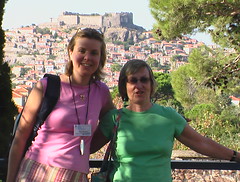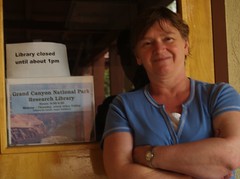I was fascinated by Kara Jones and Kate Robinson’s presentation today. They have been working with a group of international students- first asking them to recommend a physical library from their home country which they enjoyed using, and following this by asking them to choose 5 books which they feel they can recommend about their country. The Library at Bath University have bought copies of the books in their original language as well as English and have a wiki linked to their catalogue in which the students can comment on the books and recommend them to others. This is a great example of involving students, which I intend to copy at the first opportunity!

Kate and Kara (Molyvos castle in background). Sorry about the shadows
Author Archives: Moira
LASSIE (LWW conference)

Jane Secker (LSE)and Gwyneth Price (Inst of Education)[both part of the University of London] are involved in a project called LASSIE – Libraries and Social Software in Education – which is exploring how social software can enhance the experience of distance learners. They have completed a comprehensive literature review and also have a blog. I was interested in their ideas for encouraging groups of students to use del.icio.us to share useful websites as part of coursework – I’d like to try this out with some of my students.
LWW Day 1
LWW isn’t just about information literacy, but has a broad remit covering technological and social issues relating to information, so I thought people might be interested in some of the papers. The programme began with a keynote presentation from Christine Borgman, Professor in Information Studies at UCLA. Chris emphasised that the role of data will have a significant influence on how libraries develop in future and talked about the value chain linking together publications with their research data. Her paper linked well with a following talk from Graham Pryor, who described how Project StORe has been developing middleware to provide links from output publications to source data. Graham summarised some of the advantages and disadvantages as perceived by researchers – for example, advantages include validation of experiments, ability to track research output and explore research in more detail, as well as identify collaborators. Worries were identified as fears of scavengers and misinterpretation of data.

Sunset over the Aegean
Libraries without Walls, Lesvos, Greece
This is the first day of the LWW conference – and this has to be one of the best conference locations I’ve ever been to. This is the view from my hotel room of Molyvos and the Aegean!
The conference programme looks good too. I’m looking forward to hearing the talk by Kara Jones and Kate Robinson – Kara tells me it is about a project which involves international students contributing their views on books from their home country into a wiki which then links into the library catalogue. Sounds like a great idea. More when I’ve actually heard the presentation!
Just another pic of the sea:
In their own words
I’ve just had a look at this new publication “In their own words” from JISC which looks at e-learning, its benefits, possibilities and challenges, from the perspective of the learner. It makes interesting reading, confirming much which we already know about wikipedia and Google use. I was a bit mystified by this statement though: ” .. library and learning centre staff would benefit from evaluations of how best to conduct and support research activites” It’s a bit depressing!

Yosemite National Park
International students – how can exclusivity lead to inclusivity?
Next week I’m going to the LWW7 conference in Greece, with Marie Scopes from Leeds Met and Karen Senior from Bolton, to present our paper on library support for international students. As part of our project, we’ve run a questionnaire, survey websites and talked to students to discover just what the situation and issues are, before proposing some solutions and examples of good practice. The paper will be published in the LWW7 conference proceedings and the full SCONUL report next January.

San Francisco Airport Library
SLOSHED again
The impact of IL
One thing I am very interested in is how we can measure the difference that information activities make. I have looked at quite a few diagnostic tests, and while they are good for ascertaining levels of understanding and skills attainment,they are quite specifically about IL and probably predispose the particpant to select the correct answers. Whether the IL activities have really made a difference to learning attitudes and habits is more difficult to measure. I have read a few papers about this recently and particularly like the ideas in “Direct assessment of IL using writing portfolios” by Scharf in the Journal of Academic Librarianship 2007 33(4) 462-78.
I am hoping to use this technique in a project I’m working on with Dr Bleasdale, a chemistry lecturer here at Newcastle. Basically, I will look at one of the first pieces of chemistry coursework and assess IL levels evidenced in them. A variety of IL activities will take place over the year and then I will examine a further set of chemistry coursework at the end to see of there is evidence of better IL understanding.
If there is anyone reading this who has other suggestions for measuring impact, I’d be very pleased to hear from you – email me and I’ll add your comments to the blog.

Spring in Durham (no rain!)
CPD for academics
I was recently asked to assess a Northumbria University RECAP Guide. RECAP (Researching the Challenges in Academic Practice) Guides are published by the MARCET Staff Development Centre at Northumbria and the guide I assessed is entitled “Priorities for CPD of academics at Northumbria University”. It reports on a small scale study to determine which development activities, formal and informal, staff had found most influential, with a view to build on successful formal events. It is available from MARCET

Newcastle Millenium Bridge
SCONUL WGIL website
I’ve just been updating the WGIL website (still a bit of a struggle for me, but I’m getting there!), so I thought I’d just give it a quick plug in case there are folks reading this who don’t know about it. On it, as well as the original 7 Pillars article, you’ll find up to date details of all members of the working group and our action plan for the coming year.

